Discover Sex and Psychology Podcast
Sex and Psychology Podcast

Sex and Psychology Podcast
Author: Dr. Justin Lehmiller
Subscribed: 2,195Played: 102,177Subscribe
Share
© Justin J. Lehmiller. All rights reserved.
Description
The Sex and Psychology Podcast is the sex ed you never got in school—and won’t find anywhere else. Kinsey Institute researcher Dr. Justin Lehmiller takes you on a journey through the psychology of sex and relationships, offering practical tips along the way that can help you take your intimate life to the next level. Learn more on Dr. Lehmiller’s blog at sexandpsychology.com
461 Episodes
Reverse
Most New Year’s resolutions fail, but it doesn’t have to be this way. In this episode, we’re going to explore how to set sexy goals that actually stick. Learn how to turn intention into intimacy and make this your best year yet for connection and pleasure, whether you’re in a relationship or flying solo.
My guest is Ashley Weller. She is a Human Sexuality and Health Psychology Professor at Chapman University in Southern California. Ashley also has a podcast called What’s Your Position that tackles issues surrounding sexuality, relationships, life, and love from a comedic yet educational point of view.
Some of the specific topics we explore in this episode include:
What distinguishes resolutions that actually work from those that don’t?
What are some resolutions that can improve the relationship you have with yourself?
What are some good resolutions to consider for better sex with a partner?
How can we resolve to make sex more of a priority in our lives?
You can check out What’s Your Position here.
Got a sex question? Send me a podcast voicemail to have it answered on a future episode at speakpipe.com/sexandpsychology.
***
Thank you to our sponsors!
Passionate about building a career in sexuality? Check out the Sexual Health Alliance. With SHA, you’ll connect with world-class experts and join an engaged community of sexuality professionals from around the world. Visit SexualHealthAlliance.com and start building the sexuality career of your dreams today.
If you’re ready to ditch the shady stuff and choose a libido supplement that’s effective and that you can feel confident about, it’s time to check out Drive Boost. Visit vb.health and use code JUSTIN for 10% off.
***
Want to learn more about Sex and Psychology? Click here for previous articles or follow the blog on Facebook, Twitter, or Bluesky to receive updates. You can also follow Dr. Lehmiller on YouTube and Instagram.
Listen and stream all episodes on Apple, Spotify, or Amazon. Subscribe to automatically receive new episodes and please rate and review the podcast!
Credits: Precision Podcasting (Podcast editing) and Shutterstock/Florian (Music). Image created with Canva; photos used with permission of guest.
If you’re feeling hornier than usual right now, it’s not just you! The winter holidays are a time of year when sexual interest and behavior reliably increase. We see this in everything from a spike in condom sales to an increase in sexual injuries to a peak in STD rates early in the new year. So why is that? That’s what we’re going to explore in today’s episode.
Some of the specific topics we’re discussing include:
How (and why) does sexual behavior change with the seasons?
Why is Santa such a popular sex symbol at this time of year?
How do you prevent holiday stress from spoiling the mood?
Got a sex question? Send me a podcast voicemail to have it answered on a future episode at speakpipe.com/sexandpsychology.
***
Thank you to our sponsors!
Firmtech’s Tech Ring will help you to track your sexual health–and keep it up. Visit myfirmtech.com/justinlehmiller and use code JUSTIN15 for 15% off your purchase.
If you’re ready to ditch the shady stuff and choose a libido supplement that’s effective and that you can feel confident about, it’s time to check out Drive Boost. Visit vb.health and use code JUSTIN for 10% off.
The Kinsey Institute is where the world turns to understand sex and relationships. You can help continue its expert-led research by donating to the Kinsey Institute Research Fund. Learn more and make a donation here: https://give.myiu.org/centers-institutes/I380010749.html
***
Want to learn more about Sex and Psychology? Click here for previous articles or follow the blog on Facebook, Twitter, or Bluesky to receive updates. You can also follow Dr. Lehmiller on YouTube and Instagram.
Listen and stream all episodes on Apple, Spotify, or Amazon. Subscribe to automatically receive new episodes and please rate and review the podcast!
Credits: Precision Podcasting (Podcast editing) and Shutterstock/Florian (Music). Image created with Canva; photos used with permission of guest. Holiday photo by Arthur Brognoli on Unsplash.
Erectile dysfunction has long been treated with guesswork and one-size-fits-all solutions. But new technology is changing that by making erections measurable. In this episode, we explore the FirmTech TechRing, a wearable that tracks erection data during sleep and sex, and what insights from over 136,000 erections reveal about erectile fitness, overall health, and the future of data-driven sexual medicine.
I am joined once again by Dr. Elliot Justin, the CEO and founder of FirmTech, a sextech company focused on keeping men fit and firm for a lifetime of lovemaking. He is an Emergency Medicine specialist and health care technology consultant who has spent 25 years practicing emergency medicine and directing ERs.
Some of the specific topics we explore in this episode include:
How is the TechRing different from a traditional penis ring?
What can real-time erection data tell men about their health?
How does using an erection ring compare to taking an ED medication?
How can an erection ring make sex better?
Check out FirmTech’s website to learn more and use code JUSTIN15 for 15% off your purchase.
Got a sex question? Send me a podcast voicemail to have it answered on a future episode at speakpipe.com/sexandpsychology.
***
Thank you to our sponsors!
Thread & Tether is a therapy practice dedicated to helping couples rebuild trust, strengthen intimacy, and heal after betrayal. Led by AASECT-certified sex therapist Jason Powell, the practice offers virtual sessions in multiple states and in-person intensives in Boston and Manhattan. Visit threadandtether.com to learn more.
***
Want to learn more about Sex and Psychology? Click here for previous articles or follow the blog on Facebook, Twitter, or Bluesky to receive updates. You can also follow Dr. Lehmiller on YouTube and Instagram.
Listen and stream all episodes on Apple, Spotify, or Amazon. Subscribe to automatically receive new episodes and please rate and review the podcast!
Credits: Precision Podcasting (Podcast editing) and Shutterstock/Florian (Music). Image created with Canva; photos used with permission of guest.
What actually has to happen inside the body for an erection to occur? And what is the most common cause of erectile dysfunction (ED)? In today’s show, we’re diving into the science of how erections work, as well as why men sometimes struggle to get or maintain them. We’ll also unpack some common misconceptions about ED and discuss why the standard “just take a pill approach” overlooks a bigger issue.
My guest is Dr. Elliot Justin, the CEO and founder of FirmTech, a sextech company focused on keeping men fit and firm for a lifetime of lovemaking. He is an Emergency Medicine specialist and healthcare technology consultant who has spent 25 years practicing emergency medicine and directing ERs.
Some of the specific topics we explore in this episode include:
What are the biggest things people get wrong about erectile dysfunction?
What is venous leak, and why is it such an under-diagnosed contributor to ED?
Why do nighttime erections happen, and what do they tell us about men’s health?
What’s the problem with using pills as a one-size-fits-all solution to ED?
Check out FirmTech’s website to learn more and use code JUSTIN15 to save 15% off your purchase.
Got a sex question? Send me a podcast voicemail to have it answered on a future episode at speakpipe.com/sexandpsychology.
***
Thank you to our sponsors!
The Kinsey Institute is where the world turns to understand sex and relationships. You can help continue its expert-led research by donating to the Kinsey Institute Research Fund. Learn more and make a donation here: https://give.myiu.org/centers-institutes/I380010749.html
Passionate about building a career in sexuality? Check out the Sexual Health Alliance. With SHA, you’ll connect with world-class experts and join an engaged community of sexuality professionals from around the world. Visit SexualHealthAlliance.com and start building the sexuality career of your dreams today.
***
Want to learn more about Sex and Psychology? Click here for previous articles or follow the blog on Facebook, Twitter, or Bluesky to receive updates. You can also follow Dr. Lehmiller on YouTube and Instagram.
Listen and stream all episodes on Apple, Spotify, or Amazon. Subscribe to automatically receive new episodes and please rate and review the podcast!
Credits: Precision Podcasting (Podcast editing) and Shutterstock/Florian (Music). Image created with Canva; photos used with permission of guest.
Most people think men’s sexual orientation is pretty straightforward: if you’re gay, you only sleep with men, and if you’re straight, you only sleep with women. But things aren’t always that simple. In today’s show, we’re exploring a reality that doesn’t fit the script—gay men who are out and confident in their identity, but who sometimes sleep with women.
I am joined once again by Dr. Joe Kort, the clinical director and founder of The Center for Relationship and Sexual Health in Royal Oak, Michigan. He is a board-certified clinical sexologist and author of multiple books, including Cracking the Erotic Code: Helping Gay Men Understand Their Fantasies.
Some of the specific topics we explore in this episode include:
What are the main reasons why some gay men have sex with women?
Why might a woman want to have sex with a gay man?
Does your sexual behavior necessarily have to align with your sexual identity?
Why do people sometimes engage in behaviors that don’t seem to match up with their sexual orientation?
You can visit Joe’s website to learn more about his work.
Got a sex question? Send me a podcast voicemail to have it answered on a future episode at speakpipe.com/sexandpsychology.
***
Thank you to our sponsors!
Expand your sexual horizons with Beducated! Featuring more than 100 online courses taught by the experts, Beducated brings pleasure-based sex ed directly into your bedroom. Enjoy a free trial today and get 50% off their yearly pass by using LEHMILLER as the coupon code. To redeem this offer, visit: https://beducate.me/pd2550-lehmiller
If you’re ready to ditch the shady stuff and choose a libido supplement that’s effective and that you can feel confident about, it’s time to check out Drive Boost. Visit vb.health and use code JUSTIN for 10% off.
Passionate about building a career in sexuality? Check out the Sexual Health Alliance. With SHA, you’ll connect with world-class experts and join an engaged community of sexuality professionals from around the world. Visit SexualHealthAlliance.com and start building the sexuality career of your dreams today.
***
Want to learn more about Sex and Psychology? Click here for previous articles or follow the blog on Facebook, Twitter, or Bluesky to receive updates. You can also follow Dr. Lehmiller on YouTube and Instagram.
Listen and stream all episodes on Apple, Spotify, or Amazon. Subscribe to automatically receive new episodes and please rate and review the podcast!
Credits: Precision Podcasting (Podcast editing) and Shutterstock/Florian (Music). Image created with Canva; photos used with permission of guest.
Although gay men are often seen as being pretty uninhibited when it comes to sex, their fantasy lives tell a more complex story. Like everyone else, many gay men experience shame, confusion, or conflict around their fantasies. In today’s show, we’re diving into common themes that show up in gay men’s fantasies, the psychology behind them, and how to drop the shame.
My guest is Dr. Joe Kort, the clinical director and founder of The Center for Relationship and Sexual Health in Royal Oak, Michigan. He is a board-certified clinical sexologist and author of multiple books, including Cracking the Erotic Code: Helping Gay Men Understand Their Fantasies.
Some of the specific topics we explore in this episode include:
What do sexual fantasies actually mean or represent?
What kinds of things are gay men likely to fantasies about?
Why are taboo themes so prevalent in gay men’s fantasies?
How does porn shape gay men’s fantasies?
What do gay men who feel ashamed or confused about their fantasies need to know?
You can visit Joe’s website to learn more about his work.
Got a sex question? Send me a podcast voicemail to have it answered on a future episode at speakpipe.com/sexandpsychology.
***
Thank you to our sponsors!
Firmtech’s Tech Ring will help you to track your sexual health–and keep it up. Visit myfirmtech.com/justinlehmiller and use code JUSTIN15 for 15% off your purchase.
If you’re ready to ditch the shady stuff and choose a libido supplement that’s effective and that you can feel confident about, it’s time to check out Drive Boost. Visit vb.health and use code JUSTIN for 10% off.
The Kinsey Institute is where the world turns to understand sex and relationships. You can help continue its expert-led research by donating to the Kinsey Institute Research Fund. Learn more and make a donation here: https://give.myiu.org/centers-institutes/I380010749.html
***
Want to learn more about Sex and Psychology? Click here for previous articles or follow the blog on Facebook, Twitter, or Bluesky to receive updates. You can also follow Dr. Lehmiller on YouTube and Instagram.
Listen and stream all episodes on Apple, Spotify, or Amazon. Subscribe to automatically receive new episodes and please rate and review the podcast!
Credits: Precision Podcasting (Podcast editing) and Shutterstock/Florian (Music). Image created with Canva; photos used with permission of guest.
People’s definitions of cheating are evolving. Infidelity isn’t just about physical betrayal anymore. It’s emotional, it’s digital, and sometimes it doesn’t even involve another human at all. In today’s show, we’re diving into the new rules of cheating. We’re also going to talk about how modern technology is making it harder than ever to keep infidelity a secret.
I am joined once again by Dr. Amanda Gesselman a research scientist and head of the VIBES research team at the Kinsey Institute at Indiana University. Digital intimacy is a major focus of her research, including how people use tools like camsites, AI companions, dating apps, and social media to navigate connection and desire.
Some of the specific topics we explore in this episode include:
What do people today think “counts” as cheating?
Is watching porn a form of infidelity? What about sexting with an AI chatbot?
How many people suspect a partner has cheated on them before?
What kind of detective work do people do to determine if a partner has cheated?
How do we balance the benefits and challenges of digital intimacy?
To learn more, you can read a brief report of this study here.
Got a sex question? Send me a podcast voicemail to have it answered on a future episode at speakpipe.com/sexandpsychology.
***
Thank you to our sponsors!
Thread & Tether is a therapy practice dedicated to helping couples rebuild trust, strengthen intimacy, and heal after betrayal. Led by AASECT-certified sex therapist Jason Powell, the practice offers virtual sessions in multiple states and in-person intensives in Boston and Manhattan. Visit threadandtether.com to learn more.
Passionate about building a career in sexuality? Check out the Sexual Health Alliance. With SHA, you’ll connect with world-class experts and join an engaged community of sexuality professionals from around the world. Visit SexualHealthAlliance.com and start building the sexuality career of your dreams today.
***
Want to learn more about Sex and Psychology? Click here for previous articles or follow the blog on Facebook, Twitter, or Bluesky to receive updates. You can also follow Dr. Lehmiller on YouTube and Instagram.
Listen and stream all episodes on Apple, Spotify, or Amazon. Subscribe to automatically receive new episodes and please rate and review the podcast!
Credits: Precision Podcasting (Podcast editing) and Shutterstock/Florian (Music). Image created with Canva; photos used with permission of guest.
Popular GLP-1 medications like Ozempic, Wegovy, and Zepbound aren’t just transforming weight loss. They’re also changing our intimate lives in surprising ways. In today’s show, we’re diving into results from a new national study finding that a majority of people taking one of these medications reported a change in their sex and dating lives, for better or for worse.
My guest is Dr. Amanda Gesselman a research scientist and head of the VIBES research team at the Kinsey Institute at Indiana University. Digital intimacy is a major focus of her research, including how people use tools like camsites, AI companions, dating apps, and social media to navigate connection and desire.
Some of the specific topics we explore in this episode include:
What specific changes are people noticing in their dating lives as a result of taking one of these drugs?
Why does weight loss seem to be benefiting men more than women when it comes to dating?
How do GLP-1 medications affect sexual health and function? And is it different for men and women?
Are people taking GLP-1 medications worried about social judgement?
To learn more, you can read a brief report about the study here.
Got a sex question? Send me a podcast voicemail to have it answered on a future episode at speakpipe.com/sexandpsychology.
***
Thank you to our sponsors!
Firmtech’s Tech Ring will help you to track your sexual health–and keep it up. Visit myfirmtech.com/justinlehmiller and use code JUSTIN15 for 15% off your purchase.
The Kinsey Institute is where the world turns to understand sex and relationships. You can help continue its expert-led research by donating to the Kinsey Institute Research Fund. Learn more and make a donation here: https://give.myiu.org/centers-institutes/I380010749.html
***
Want to learn more about Sex and Psychology? Click here for previous articles or follow the blog on Facebook, Twitter, or Bluesky to receive updates. You can also follow Dr. Lehmiller on YouTube and Instagram.
Listen and stream all episodes on Apple, Spotify, or Amazon. Subscribe to automatically receive new episodes and please rate and review the podcast!
Credits: Precision Podcasting (Podcast editing) and Shutterstock/Florian (Music). Image created with Canva; photos used with permission of guest.
How do you make a non-monogamous relationship work? In today’s show, we’re diving into a brand-new study that set out to map the most common and effective relationship practices for consensually non-monogamous (CNM) people. We’re going to discuss the key strategies that help people maintain multiple partners with intention, stability, and harmony.
I am joined once again by Dr. Justin Mogilski, an associate professor of psychology at the University of South Carolina Salkehatchie, where he teaches courses on human sexuality, the psychology of marriage, and evolutionary psychology.
Some of the specific topics we explore in this episode include:
What is the Multiple Relationships Maintenance Scale, and what can it tell us about how CNM relationships work?
How do people in CNM relationships navigate things like jealousy, resource distribution, and hierarchy?
What are people in the most successful CNM relationships doing?
What can monogamous couples learn from how CNM people structure their relationships?
You can click this link to read the full study discussed in this episode.
Got a sex question? Send me a podcast voicemail to have it answered on a future episode at speakpipe.com/sexandpsychology.
***
Thank you to our sponsors!
Wrap the ones you love in luxury with Cozy Earth. Discover bedtime bliss with Cozy Earth’s bamboo sheet set and loungewear. Using code JUSTIN to get 40% off your purchase.
If you’re ready to ditch the shady stuff and choose a libido supplement that’s effective and that you can feel confident about, it’s time to check out Drive Boost. Visit vb.health and use code JUSTIN for 10% off.
The Kinsey Institute is where the world turns to understand sex and relationships. You can help continue its expert-led research by donating to the Kinsey Institute Research Fund. Learn more and make a donation here: https://give.myiu.org/centers-institutes/I380010749.html
***
Want to learn more about Sex and Psychology? Click here for previous articles or follow the blog on Facebook, Twitter, or Bluesky to receive updates. You can also follow Dr. Lehmiller on YouTube and Instagram.
Listen and stream all episodes on Apple, Spotify, or Amazon. Subscribe to automatically receive new episodes and please rate and review the podcast!
Credits: Precision Podcasting (Podcast editing) and Shutterstock/Florian (Music). Image created with Canva; photos used with permission of guest.
Consensual non-monogamy (CNM) is something everyone seems to have an opinion on, but many people’s views are decidedly negative. For example, people often say things like “open relationships never work,” and “how is that any different than cheating?” In today’s show, we’re going to dive into common CNM myths and misconceptions and separate fact from fiction.
My guest is Dr. Justin Mogilski, an associate professor of psychology at the University of South Carolina Salkehatchie, where he teaches courses on human sexuality, the psychology of marriage, and evolutionary psychology.
Some of the specific topics we explore in this episode include:
What the difference between CNM and infidelity?
How is cheating within a CNM relationship similar to or different from cheating in a monogamous relationship?
What are some of the logistical and emotional challenges in CNM relationships?
What are some of the key components to a successful CNM relationship?
How is CNM related to sexual health and safer-sex practices?
You can click this link to read Dr. Mogilski’s large-scale study on consensual non-monogamy.
Got a sex question? Send me a podcast voicemail to have it answered on a future episode at speakpipe.com/sexandpsychology.
***
Thank you to our sponsors!
Firmtech’s Tech Ring will help you to track your sexual health–and keep it up. Visit myfirmtech.com/justinlehmiller and use code JUSTIN15 for 15% off your purchase.
Wrap the ones you love in luxury with Cozy Earth. Discover bedtime bliss with Cozy Earth’s bamboo sheet set and loungewear. Using code JUSTIN to get 40% off your purchase.
If you’re ready to ditch the shady stuff and choose a libido supplement that’s effective and that you can feel confident about, it’s time to check out Drive Boost. Visit vb.health and use code JUSTIN for 10% off.
***
Want to learn more about Sex and Psychology? Click here for previous articles or follow the blog on Facebook, Twitter, or Bluesky to receive updates. You can also follow Dr. Lehmiller on YouTube and Instagram.
Listen and stream all episodes on Apple, Spotify, or Amazon. Subscribe to automatically receive new episodes and please rate and review the podcast!
Credits: Precision Podcasting (Podcast editing) and Shutterstock/Florian (Music). Image created with Canva; photos used with permission of guest.
Many parts of female sexual anatomy have long been misunderstood, but the clitoris is chief among them. Throughout history, the clitoris is something that has repeatedly been discovered, described, and then forgotten. In today’s show, we’re going revisit one of my favorite conversations from the archives and talk all about the history and science of the clitoris.
My guest is Dr. Maria Uloko, a board certified urologist specializing in comprehensive sexual health, reconstruction and prosthesis. A former clinical professor at the University of California San Diego, Dr. Uloko is now the CEO of MUMD Sexual Medicine Consulting and the founder of VULVAi, an innovative patient advocacy tool that employs AI to aid patients grappling with vulvovaginal issues.
Some of the specific topics we explore in this episode include:
Why has it taken so long for us to gain a solid scientific understanding of the clitoris?
How many nerve endings are actually in the clitoris?
How can a better understanding of clitoral anatomy help to improve sexual health and pleasure?
Is there really a difference between clitoral and vaginal orgasms?
What is the role of testosterone in clitoral health and wellness?
You can visit Maria’s website to learn more about her work.
Got a sex question? Send me a podcast voicemail to have it answered on a future episode at speakpipe.com/sexandpsychology.
***
Thank you to our sponsors!
Passionate about building a career in sexuality? Check out the Sexual Health Alliance. With SHA, you’ll connect with world-class experts and join an engaged community of sexuality professionals from around the world. Visit SexualHealthAlliance.com and start building the sexuality career of your dreams today.***
A bad mattress can ruin your intimate life. If you want to upgrade your sleep, check out Brooklyn Bedding, where you can try a 120-night comfort trial. Go to brooklynbedding.com and use my promo code JUSTIN at checkout to get 30% off sitewide.
***
Want to learn more about Sex and Psychology? Click here for previous articles or follow the blog on Facebook, Twitter, or Bluesky to receive updates. You can also follow Dr. Lehmiller on YouTube and Instagram.
Listen and stream all episodes on Apple, Spotify, or Amazon. Subscribe to automatically receive new episodes and please rate and review the podcast!
Credits: Precision Podcasting (Podcast editing) and Shutterstock/Florian (Music). Image created with Canva; photos used with permission of guest.
It’s November again, and that means a bunch of people on the internet are giving up masturbation for the month. While “No Nut November” is a relatively recent phenomenon, it actually has deep roots and reflects humans’ longstanding and very complicated relationship with self-pleasure. In this show, we’re talking about the history of masturbation and why people are so conflicted over it.
My guest is Dr. Eric Sprankle, an Associate Professor of Clinical Psychology and the co-director of the Sexuality Studies program at Minnesota State University, Mankato. He’s also a licensed clinical psychologist and AASECT-certified sex therapist affiliated with the Minnesota Sexual Health Institute. His latest book is DIY: The Wonderfully Weird History and Science of Masturbation.
Some of the specific topics we explore in this episode include:
Where does the idea of masturbation as sinful originate?
Historically, how have religious and political figures dissuaded people from masturbating?
When did masturbation start to become a public health concern?
How has the rise of social media coincided with the rise of negative views of masturbation?
You can visit Eric’s website to learn more about his work.
Got a sex question? Send me a podcast voicemail to have it answered on a future episode at speakpipe.com/sexandpsychology.
***
Thank you to our sponsors!
The Kinsey Institute is where the world turns to understand sex and relationships. You can help continue its expert-led research by donating to the Kinsey Institute Research Fund. Learn more and make a donation here: https://give.myiu.org/centers-institutes/I380010749.html
Head to https://paired.com/JUSTIN and download the #1 app for couples to start maintaining your lasting love today.
A bad mattress can ruin your intimate life. If you want to upgrade your sleep, check out Brooklyn Bedding, where you can try a 120-night comfort trial. Go to brooklynbedding.com and use my promo code JUSTIN at checkout to get 30% off sitewide.
***
Want to learn more about Sex and Psychology? Click here for previous articles or follow the blog on Facebook, Twitter, or Bluesky to receive updates. You can also follow Dr. Lehmiller on YouTube and Instagram.
Listen and stream all episodes on Apple, Spotify, or Amazon. Subscribe to automatically receive new episodes and please rate and review the podcast!
Credits: Precision Podcasting (Podcast editing) and Shutterstock/Florian (Music). Image created with Canva; photos used with permission of guest.
Think back to your sex education for a moment. Were you advised to “save yourself for marriage?” Were you asked to sign a “purity” pledge? For millions of people, that was their experience. In this episode, we’re taking a closer look at abstinence pledges, including how they became so widespread, whether they actually work as intended, and the unseen consequences they leave behind.
I am joined once again by Lauren Elise Rogers, a Certified Holistic Sexuality Educator and Embodied Intimacy & Relationship Coach. Lauren brings an empathetic and non-judgmental approach, offering practical tools that empower her clients to take ownership of their pleasure and grow in confidence and connection.
Some of the specific topics we explore in this episode include:
What does a typical abstinence pledge look like?
How common are abstinence pledges today?
Do abstinence pledges actually delay sexual activity?
How might abstinence pledges make people less prepared for sex and relationships?
What happens when people “break” their pledge?
You can visit Lauren’s website to learn more about her work.
Got a sex question? Send me a podcast voicemail to have it answered on a future episode at speakpipe.com/sexandpsychology.
***
Thank you to our sponsors!
If you’re ready to ditch the shady stuff and choose a libido supplement that’s effective and that you can feel confident about, it’s time to check out Drive Boost. Visit vb.health and use code JUSTIN for 10% off.
Passionate about building a career in sexuality? Check out the Sexual Health Alliance. With SHA, you’ll connect with world-class experts and join an engaged community of sexuality professionals from around the world. Visit SexualHealthAlliance.com and start building the sexuality career of your dreams today.***
***
Want to learn more about Sex and Psychology? Click here for previous articles or follow the blog on Facebook, Twitter, or Bluesky to receive updates. You can also follow Dr. Lehmiller on YouTube and Instagram.
Listen and stream all episodes on Apple, Spotify, or Amazon. Subscribe to automatically receive new episodes and please rate and review the podcast!
Credits: Precision Podcasting (Podcast editing) and Shutterstock/Florian (Music). Image created with Canva; photos used with permission of guest.
For a lot of people who grew up in religious or conservative environments, they learned to fear sex and/or feel ashamed of. Purity culture teaches folks that their personal value is tied to their sexual choices: “good” people wait to have sex, while “bad” people don’t. In this episode, we’re going to talk about what it’s like to grow up in purity culture, how to move past it, and whether it’s possible to still hold onto your faith while letting go of purity culture.
My guest is Lauren Elise Rogers, a Certified Holistic Sexuality Educator and Embodied Intimacy & Relationship Coach. Lauren brings an empathetic and non-judgmental approach, offering practical tools that empower her clients to take ownership of their pleasure and grow in confidence and connection.
Some of the specific topics we explore in this episode include:
How does purity culture shape attitudes toward sex, desire, and one’s own body?
What are some ways to work through the shame that people often feel due to purity culture?
How can you begin exploring your sexuality when you still have some internal conflicts about it?
Is it possible to remain religious without adopting the sexual shame that often comes with it?
You can visit Lauren’s website to learn more about her work.
Got a sex question? Send me a podcast voicemail to have it answered on a future episode at speakpipe.com/sexandpsychology.
***
Thank you to our sponsors!
If you’re ready to ditch the shady stuff and choose a libido supplement that’s effective and that you can feel confident about, it’s time to check out Drive Boost. Visit vb.health and use code JUSTIN for 10% off.
The Kinsey Institute is where the world turns to understand sex and relationships. You can help continue its expert-led research by donating to the Kinsey Institute Research Fund. Learn more and make a donation here: https://give.myiu.org/centers-institutes/I380010749.html
***
Want to learn more about Sex and Psychology? Click here for previous articles or follow the blog on Facebook, Twitter, or Bluesky to receive updates. You can also follow Dr. Lehmiller on YouTube and Instagram.
Listen and stream all episodes on Apple, Spotify, or Amazon. Subscribe to automatically receive new episodes and please rate and review the podcast!
Credits: Precision Podcasting (Podcast editing) and Shutterstock/Florian (Music). Image created with Canva; photos used with permission of guest.
Have you ever heard that vibrators will desensitize you and ruin partnered sex forever? That sex toys are just for women, singles, or kinky folks? Or that if you need a toy, something must be wrong with your sex life or relationship? These are common beliefs, but they’re not grounded in reality. So let’s set the record straight.
My guest is Venus O’Hara, a pleasure educator, author, and content creator. She became Spain’s first professional sex toy tester, and since 2014 has tested and reviewed over 1,000 products from leading sexual wellness brands worldwide. She is the author of Orgasmic Manifestation and hosts the podcast, The Orgasmic Lifestyle.
Some of the specific areas we explore in this show include:
What do you need to know if you’re worried about becoming too “dependent” on sex toys?
How can people introduce sex toys into partnered sex without stoking insecurity?
Are sex toys just for women and single people?
What are some beginner-friendly sex toys worth considering?
What should you do if you try a toy and find that it doesn’t seem to do much for you?
Learn more about Venus by checking out her website here.
Got a sex question? Send me a podcast voicemail to have it answered on a future episode at speakpipe.com/sexandpsychology.
***
Thank you to our sponsors!
Passionate about building a career in sexuality? Check out the Sexual Health Alliance. With SHA, you’ll connect with world-class experts and join an engaged community of sexuality professionals from around the world. Visit SexualHealthAlliance.com and start building the sexuality career of your dreams today.***
Want to learn more about Sex and Psychology? Click here for previous articles or follow the blog on Facebook, Twitter, or Bluesky to receive updates. You can also follow Dr. Lehmiller on YouTube and Instagram.
Listen and stream all episodes on Apple, Spotify, or Amazon. Subscribe to automatically receive new episodes and please rate and review the podcast!
Credits: Precision Podcasting (Podcast editing) and Shutterstock/Florian (Music). Image created with Canva; photos used with permission of guest.
A sex toy is so much more than just a fun gadget. Toys can help us to explore our bodies, rekindle the connection in a relationship, improve sexual communication, and more. In this episode, we’re going behind the scenes of how sex toys are designed and developed. We’re also going to talk about what makes a toy truly great, as well as how to tell which toys are worth your money and which ones aren’t.
I am joined by Venus O’Hara, a pleasure educator, author, and content creator. She became Spain’s first professional sex toy tester, and since 2014 has tested and reviewed over 1,000 products from leading sexual wellness brands worldwide. She is the author of Orgasmic Manifestation and hosts the podcast, The Orgasmic Lifestyle.
Some of the specific areas we explore in this show include:
What does it mean to view sex toys as experiences rather than products?
What all goes into designing and developing a new sex toy?
How can you tell the good sex toys from the bad?
In what ways can sex toys help us to improve our sex lives?
Learn more about Venus by checking out her website here.
Got a sex question? Send me a podcast voicemail to have it answered on a future episode at speakpipe.com/sexandpsychology.
***
Thank you to our sponsors!
Expand your sexual horizons with Beducated! Featuring more than 100 online courses taught by the experts, Beducated brings pleasure-based sex ed directly into your bedroom. Enjoy a free trial today and get 65% off their yearly pass by using LEHMILLER69 as the coupon code. To redeem this offer, visit: https://beducate.me/pd2546-lehmiller
The Kinsey Institute is where the world turns to understand sex and relationships. You can help continue its expert-led research by donating to the Kinsey Institute Research Fund. Learn more and make a donation here: https://give.myiu.org/centers-institutes/I380010749.html
***
Want to learn more about Sex and Psychology? Click here for previous articles or follow the blog on Facebook, Twitter, or Bluesky to receive updates. You can also follow Dr. Lehmiller on YouTube and Instagram.
Listen and stream all episodes on Apple, Spotify, or Amazon. Subscribe to automatically receive new episodes and please rate and review the podcast!
Credits: Precision Podcasting (Podcast editing) and Shutterstock/Florian (Music). Image created with Canva; photos used with permission of guest.
From sayings like “freak in the head, freak in the bed” to the hot/crazy matrix to memes about “daddy issues,” the internet is full of content suggesting that mentally and emotionally unstable people make for hotter sex partners. But is that really true? In this episode, we’re breaking down some of the biggest myths about sex and relationships that dominate social media.
I am joined once again by Joe Nucci, a licensed psychotherapist, writer, and social media influencer. His debut book, Psychobabble: Viral Mental Health Myths & the Truth To Set You Free, is available wherever books are sold.
Some of the specific topics we explore in this episode include:
Why are people with psychopathic characteristics often rated as more attractive?
How are mental health conditions associated with sex drive and sexual behavior?
Are people with “daddy issues” more eager to please in bed?
Will therapy make you ready for a relationship?
You can check out Joe’s website to learn more about his work.
Got a sex question? Send me a podcast voicemail to have it answered on a future episode at speakpipe.com/sexandpsychology.
***
Thank you to our sponsors!
If you’re ready to ditch the shady stuff and choose a libido supplement that’s effective and that you can feel confident about, it’s time to check out Drive Boost. Visit vb.health and use code JUSTIN for 10% off.
Head to https://paired.com/JUSTIN and download the #1 app for couples to start maintaining your lasting love today.
***
Want to learn more about Sex and Psychology? Click here for previous articles or follow the blog on Facebook, Twitter, or Bluesky to receive updates. You can also follow Dr. Lehmiller on YouTube and Instagram.
Listen and stream all episodes on Apple, Spotify, or Amazon. Subscribe to automatically receive new episodes and please rate and review the podcast!
Credits: Precision Podcasting (Podcast editing) and Shutterstock/Florian (Music). Image created with Canva; photos used with permission of guest.
Social media has turned therapy into a language that almost everyone seems to speak these days, which is why your feed is probably full of posts about topics like trauma, boundaries, and gaslighting. In this episode, we’re taking a closer look at the rise of “therapy speak” and how, for better or for worse, it’s reshaping the way we talk about emotions, conflict, and relationships.
I am joined by Joe Nucci, a licensed psychotherapist, writer, and social media influencer. His debut book, Psychobabble: Viral Mental Health Myths & the Truth To Set You Free, is available wherever books are sold.
Some of the specific topics we explore in this episode include:
What are some of the problems with overusing therapy speak?
How is social media changing the way people think about and approach relationships?
What does the term “love-bombing” actually mean?
How do you know the difference between something like love-bombing and just moving fast in a relationship?
You can check out Joe’s website to learn more about his work.
Got a sex question? Send me a podcast voicemail to have it answered on a future episode at speakpipe.com/sexandpsychology.
***
Thank you to our sponsors!
If you’re ready to ditch the shady stuff and choose a libido supplement that’s effective and that you can feel confident about, it’s time to check out Drive Boost. Visit vb.health and use code JUSTIN for 10% off.
The Kinsey Institute at Indiana University is where the world turns to understand sex and relationships. Now, you can help continue its expert-led research. This month, the Match Group is offering an incredible 2:1 match for all gifts to the Kinsey Institute Research Fund. Learn more and make a donation here: https://knsy.in/giftmatch
***
Want to learn more about Sex and Psychology? Click here for previous articles or follow the blog on Facebook, Twitter, or Bluesky to receive updates. You can also follow Dr. Lehmiller on YouTube and Instagram.
Listen and stream all episodes on Apple, Spotify, or Amazon. Subscribe to automatically receive new episodes and please rate and review the podcast!
Credits: Precision Podcasting (Podcast editing) and Shutterstock/Florian (Music). Image created with Canva; photos used with permission of guest.
All too often, survivors of sexual violence are treated as though they’re permanently broken. However, healing and recovery are possible. My guest today has written a new book that explores how survivors reclaim sex, intimacy, and desire after assault. It’s unlike most other books on trauma because it dares to ask not just how people survive, but also how they thrive again.
I am joined by Katie Simon (they/them), a sexuality journalist and author of Tell Me What You Like: An Honest Discussion of Sex and Intimacy After Sexual Assault. Their writing has previously appeared in The New York Times, New York Magazine, Vogue, The Washington Post, Playboy, and Women’s Health.
Some of the specific topics we explore in this episode include:
What is the role of self-exploration in navigating sex and intimacy after sexual assault?
What are some practical things that can potentially help survivors of sexual assault?
What does the concept of post-traumatic growth look like in practice?
How can helping professionals become better-equipped to serve survivors?
You can visit Katie’s website to learn more about their work.
Got a sex question? Send me a podcast voicemail to have it answered on a future episode at speakpipe.com/sexandpsychology.
***
Thank you to our sponsors!
Passionate about building a career in sexuality? Check out the Sexual Health Alliance. With SHA, you’ll connect with world-class experts and join an engaged community of sexuality professionals from around the world. Visit SexualHealthAlliance.com and start building the sexuality career of your dreams today.
***
Want to learn more about Sex and Psychology? Click here for previous articles or follow the blog on Facebook, Twitter, or Bluesky to receive updates. You can also follow Dr. Lehmiller on YouTube and Instagram.
Listen and stream all episodes on Apple, Spotify, or Amazon. Subscribe to automatically receive new episodes and please rate and review the podcast!
Credits: Precision Podcasting (Podcast editing) and Shutterstock/Florian (Music). Image created with Canva; photos used with permission of guest.
When it comes to sex, we often think about safety and pleasure as being at odds with one another. But it doesn’t have to be this way. In this episode, we’re talking about some new Kinsey Institute research looking at people’s experiences with Lorals for Protection, a product designed to offer both protection and pleasure during oral sex.
I am joined by Dr. Cynthia Graham, a senior scientist at the Kinsey Institute. She is editor-in-chief of the Journal of Sex Research and conducts research on a number of important sexual health topics.
Some of the specific areas we explore in this show include:
Why do discussions about safer sex almost always leave oral sex out of the equation?
Oral sex is often thought of as a low- or no-risk activity, but is that really the case?
How come dental dams never really caught on?
How does Lorals offer something different compared to other barrier methods?
How can we help people to maximize both pleasure and safety during sexual activity?
The Kinsey Institute is where the world turns to understand sex and relationships. Now, you can help continue its expert-led research. This month, the Match Group is offering an incredible 2:1 match for all gifts to the Kinsey Institute Research Fund. Learn more and make a donation here: https://knsy.in/giftmatch
Got a sex question? Send me a podcast voicemail to have it answered on a future episode at speakpipe.com/sexandpsychology.
***
Thank you to our sponsors!
Expand your sexual horizons with Beducated! Featuring more than 100 online courses taught by the experts, Beducated brings pleasure-based sex ed directly into your bedroom. Enjoy a free trial today and get 50% off their yearly pass by using LEHMILLER as the coupon code. To redeem this offer, visit: https://beducate.me/pd2542-lehmiller
***
Want to learn more about Sex and Psychology? Click here for previous articles or follow the blog on Facebook, Twitter, or Bluesky to receive updates. You can also follow Dr. Lehmiller on YouTube and Instagram.
Listen and stream all episodes on Apple, Spotify, or Amazon. Subscribe to automatically receive new episodes and please rate and review the podcast!
Credits: Precision Podcasting (Podcast editing) and Shutterstock/Florian (Music). Image created with Canva; photos used with permission of guest.




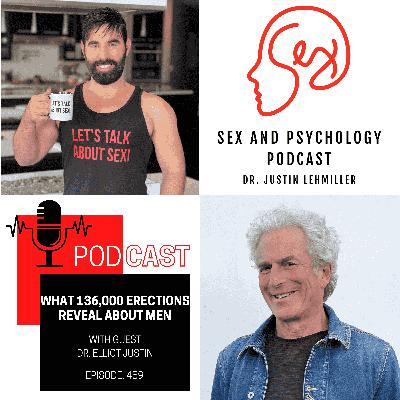
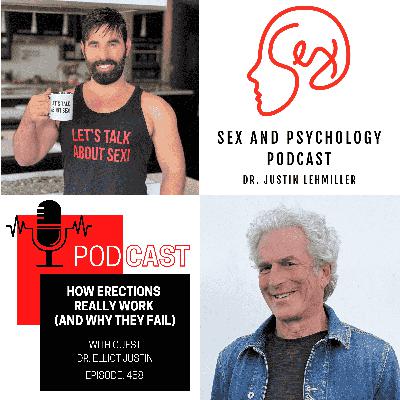



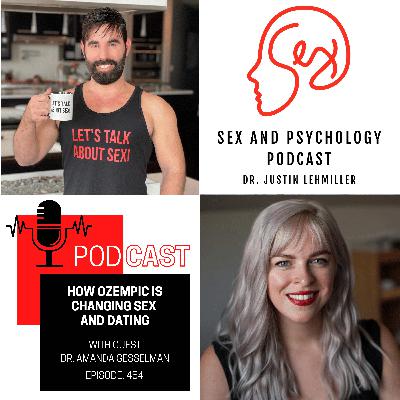

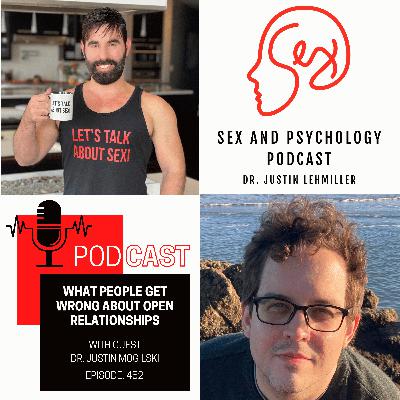

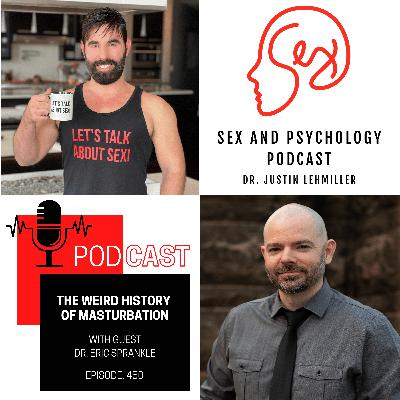
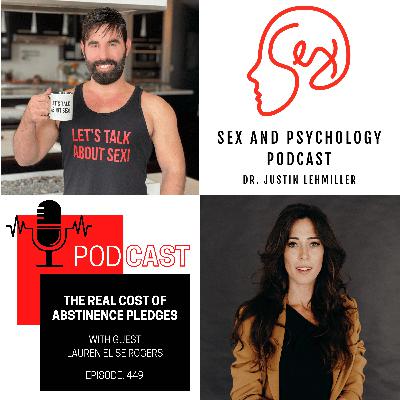



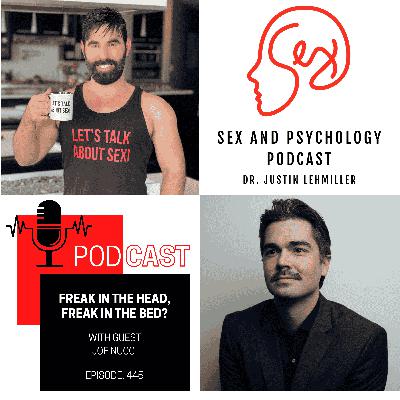






I actually have a great orgasm alone way beter than with a partner. It can be very intense. however there are times when I feel no stimulation at all and unable to climax. Great show I always learn alot , keep up the good work.
Men are not flocking to Andrew Tate because they feel rejected by society. They're doing it because the patriarchy has raised them to hate women. Now that women are starting to push back on all bullshit (as they've always done), these men who already hated women flock to Andrew Tate because he encourages their pre-existing misogynistic ways of thinking..
only 12 mins in and have already learnt a LOT that I should be thinking about
great episode! gave me some good ideas!
such a great and informative conversation, love your work as always
Love Dr. Lehmiller! As a psychologist I m learning so much about human natur in a fun an easy going way :)
Yes definitely get that moment of clarity. You took the words out of my mouth 'clarity' I was thinking as you started describing that. Definitely a happy brain moment.